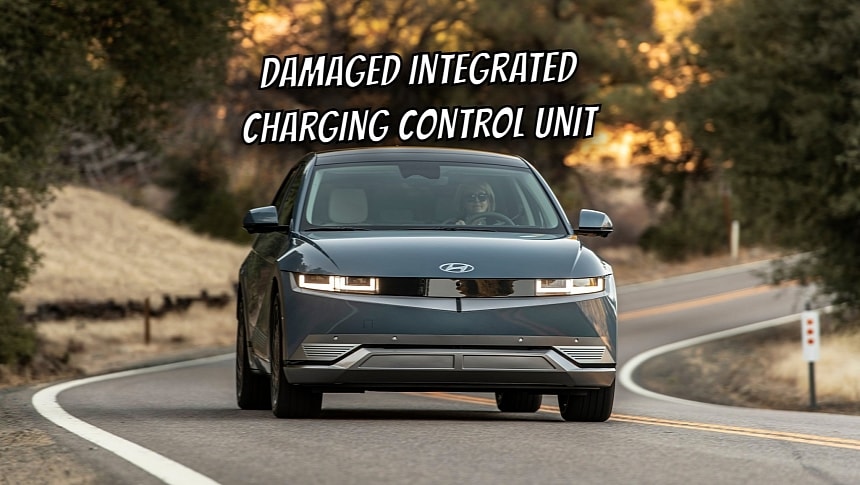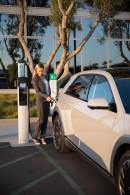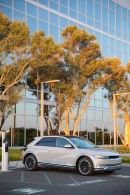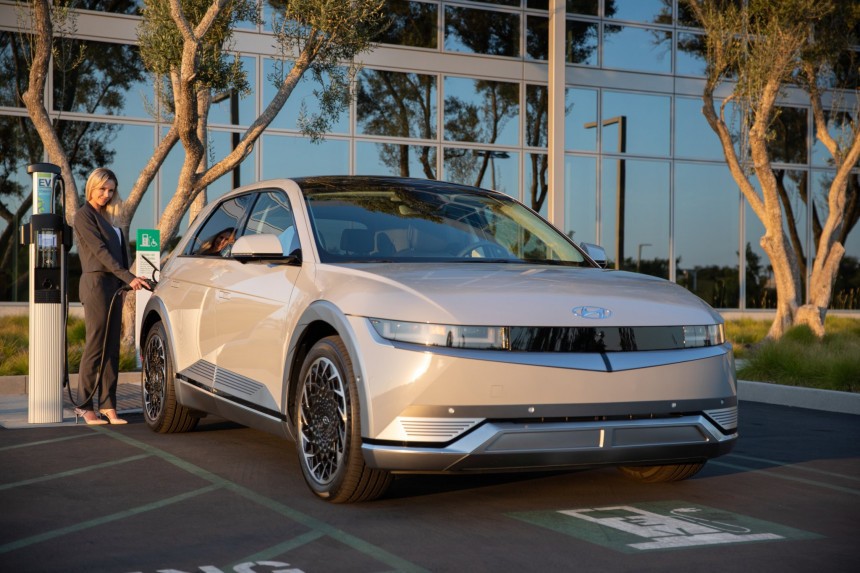Hyundai and sister brand Genesis have issued a safety recall for 98,878 electric vehicles produced for model years 2022 through 2024 for the US market. According to documents filed with the National Highway Traffic Safety Administration, the integrated charging control unit may suffer internal damage due to various electrical load conditions.
In case of a blown fuse, the ICCU will stop charging the 12-volt auxiliary battery. The South Korean automaker further notes that the electronic brain of the vehicle is programmed to enter a fail-safe mode in this scenario, which is another way of saying gradual motive power limitations. Due to the inability to recharge the 12-volt auxiliary battery, any given vehicle will eventually lose all motive power.
Hyundai Motor Company started examining ICCU warranty returns in October 2022. Hyundai engineers noted heat damage on the low-voltage converter field effect transistor of the integrated charging control unit. In April 2023, the National Highway Traffic Safety Administration informed Hyundai Motor America of a complaint alleging a loss of motive power in a US-market Ioniq 5.
Further investigations revealed that fail-safe mode provides a total drive time of up to 45 minutes until the 12-volt battery runs out of juice. After multiple back and forths between HMA and the federal watchdog, as well as two service campaigns from the Hyundai and Genesis brands in the US market, the South Korean automaker finally acknowledged the biggest problem of the fail-safe mode.
More specifically, the vehicle initially retains full motive power before entering several stages of gradually reduced motive power, increasing the risk of a crash on highways and interstates. Recalled vehicles include the 2022 to 2024 model year Hyundai Ioniq 5, the 2023 to 2024 Ioniq 5, the 2023 to 2024 Genesis GV60, the 2023 to 2024 Electrified GV70, and the 2023 to 2023 Electrified G80.
The lion's share of the recall population is taken by the Ioniq 5, which numbers 69,316 units produced between October 2021 and February 2024. Of those, 27 are used in robotaxi fleets. The suspect ICCU was produced by the Mobis Corporation, a.k.a. the parts and service division that serves the Hyundai, Kia, and Genesis brands worldwide.
Hyundai claims that a software update prevents overcurrent and implements voltage peak reduction during high-voltage battery charging. Said update also revises the operational threshold of the water pump to reduce thermal loading during charging and driving. The updated software was implemented in vehicle production in the period between February 29, 2024 and March 5, 2024.
Both dealers and owners will be informed of this recall on or about May 14, 2024. Dealers are required to have the software updated. Additionally, service technicians will replace the charging control unit and its associated fuse in case of damage.
Of the aforementioned vehicles, only the Genesis Electrified GV70 is produced stateside. The remainder comes from South Korea, with production taking place at the Ulsan and Asan plants.
Hyundai Motor Company started examining ICCU warranty returns in October 2022. Hyundai engineers noted heat damage on the low-voltage converter field effect transistor of the integrated charging control unit. In April 2023, the National Highway Traffic Safety Administration informed Hyundai Motor America of a complaint alleging a loss of motive power in a US-market Ioniq 5.
Further investigations revealed that fail-safe mode provides a total drive time of up to 45 minutes until the 12-volt battery runs out of juice. After multiple back and forths between HMA and the federal watchdog, as well as two service campaigns from the Hyundai and Genesis brands in the US market, the South Korean automaker finally acknowledged the biggest problem of the fail-safe mode.
More specifically, the vehicle initially retains full motive power before entering several stages of gradually reduced motive power, increasing the risk of a crash on highways and interstates. Recalled vehicles include the 2022 to 2024 model year Hyundai Ioniq 5, the 2023 to 2024 Ioniq 5, the 2023 to 2024 Genesis GV60, the 2023 to 2024 Electrified GV70, and the 2023 to 2023 Electrified G80.
Hyundai claims that a software update prevents overcurrent and implements voltage peak reduction during high-voltage battery charging. Said update also revises the operational threshold of the water pump to reduce thermal loading during charging and driving. The updated software was implemented in vehicle production in the period between February 29, 2024 and March 5, 2024.
Both dealers and owners will be informed of this recall on or about May 14, 2024. Dealers are required to have the software updated. Additionally, service technicians will replace the charging control unit and its associated fuse in case of damage.
Of the aforementioned vehicles, only the Genesis Electrified GV70 is produced stateside. The remainder comes from South Korea, with production taking place at the Ulsan and Asan plants.




















